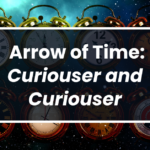The Conundrum of Time:
Have you ever wrestled with the idea that time has always got to go forward. If you have travelled extensively for pleasure or for your work, you may have already discovered that many cultures view how time ‘moves’ very differently from how it is callibrated in North America and UK.
![]()
Is there a straight arrow of time going forward in your mind based on the 24 hour clock? The arrow of time, also called time’s arrow, is the concept positing the “one-way direction”. It was developed in 1927 by the British astrophysicist Arthur Eddington.*
Or do you share the experience of time ticking by more slowly sometimes and faster on other occasions? Or can you even consider time going backwards? Read on to find the answer!
Physicists are unmasking a more fundamental source for the arrow of time: In his latest book, Carlo Rovelli explores time in ways that can shatter our picture of the universe and how we experience it. “There is no such thing as past and future” **
![]()
Yet even an eight-year-old schoolchild might protest that milk goes off, fireworks lose their energy, buildings disintegrate, athletes get tired, people age, all through time going forwards.
If we all gave up on the concept of the arrow of time we would be forced to abandon many of the words and concepts that make sense. Words like before and after and even during. What about beginning and end, yet, until, so far, next and so on.
As Lewis Caroll wrote in Alice in Wonderland: “It’s a Poor Sort of Memory that Only Works Backwards.” (TIME) and “I can’t go back to yesterday because I was a different person then” (SPACE) (echoing Heraclitus)
DO NOT CONFUSE Difference (nouns) with Change (verbs)
When you guess the cause of a disaster, it is so easy to jump at a change that just happened, without looking for what’s different about what was affected. There’s a chasm separating difference and change. Things are different from each other through space: it is through time that they change.
When the two are confused in your mind, it can easily prevent you from uncovering the real cause of something that has gone wrong.
Broadly speaking:
Difference is about the characteristics of a thing – a noun which is stable
Change is about the movement in a verb, something happening or doing, needing energy.
The cause of a disaster is due to the impact of what has been done/happened (verb) that has affected a particular thing (noun) because of its history or special characteristics.
Verb and noun complete a sentence, just as you show time and space in an ordinary graph. (Even when there is just a verb of command, “Stop!” the noun is ‘understood’ ie YOU stop!)
“No man ever steps into the same river twice, for it’s not the same river and he’s not the same man.” Heraclitus. Here ‘steps’ seems as if it’s the same verb, but the nouns ‘man’ and ‘river’ appear to have changed – not the same river, not the same man. You have to wrestle with it. This unusual insight stems from the sleight of hand confusion between difference and change. Heraclitus loved paradox to stimulate new thoughts.
Our perception that time is flowing may be partly because energy is related to time, not space: it is more a transitory verb than a static and material noun. This is what Heraclitus was exploiting.
When you consider cause-and-effect, it seems inevitable that any cause must have happened before its effect. Indeed post hoc propter hoc warns us against jumping to the conclusion that something which happened before a disaster was its most likely cause. (EDITOR: post hoc propter hoc is short for “post hoc, ergo propter hoc,” a Latin phrase meaning “after this, therefore because of this.” The phrase expresses the logical fallacy of assuming that one thing caused another merely because the first thing preceded the other.)
![]()
Prediction, truth and lies
Politicians are often accused of lying to the electorate. In England, for example, the Prime Minister, Rishi Sunak, in 2023 made a commitment to a priority to ‘stop the boats’, that is, to prevent thousands of illegal immigrants from crossing the English Channel from France in rubber dinghies. His was no lie. His so-called promise was an aim that he was attempting to achieve, a hope or intention made about the future that hadn’t happened when he spoke.
One cannot tell lies about the future, only about the present and the past. Truth about the future could not have arrived when Sunak set his aim.
When Time can go Backwards and Forwards: in your imagination
You can manipulate time in your imagination. The only way you can see time going backwards as well as forwards is when you reach the blinding insight that causality can run both ways when you think about the concept of causality.
Causality allows you to ask both what has caused this, looking backwards, and what could that cause, looking forwards: not only for a disaster that has already happened but also for a design or decision you hope to get right for the future. This requires your imagination as well as your logic. You have to picture it imaginatively as well as think it through logically.
There is a way through this confusion: visually, by putting time into space. To resolve the dilemma, we need to turn to a spatial view of how we think using a graph.

This graph will be familiar to you, with time along the bottom moving from left to right (as in our Western concept of time). However, you can change the axes. The vertical parameter of difference in space and the horizontal parameter of change in time, are equally reversible, up or down, rather than along through time, whilst still being true and unchanging.

Comparing the graphs with the ‘arrow of time’ forward motion only, allows you to embrace other descriptions of time as well, especially its reversibility: as this graph below shows.

Effective Intelligence
Thinking through causality is a tough endeavour: it requires intelligence and imagination. The role of imagination in finding ‘cause’ is a neglected skill… though accident investigators have to be very good at it.
With the system of thought that Effective Intelligence brings to you, your imagination is placed equally with your logic. And there is a third dimension as well, namely ‘gathering information’. You cannot diagnose cause without forensic attention to the information you need – and getting information can be a demanding and time-consuming task… especially if you waste time collecting information that turns out not to be relevant.
If you haven’t yet discovered how you balance your logical thinking with your imagination, along with gathering information, then you can find out with the Rhodes Thinking Intentions Profile
REFERENCES – if you would like to dig a bit deeper
* Arrow of Time (Wikipedia)
(Seth Lloyd, now an MIT professor, came up with the idea that entanglement might explain Sir Arthur Eddington’s arrow of time while he was in graduate school at Cambridge University in the1980s.) Time’s Arrow Traced to Quantum Source
** ‘Time is elastic’: an extract from Carlo Rovelli’s The Order of Time
A reference of interest on polychronic time if you do a lot of travelling across the world.
A warning is given in this article which might be relevant if your work takes you to a polychronic culture. “… most of the world operates on polychronic time, so the assumptions made in the monochronic culture about respecting project deadlines are not shared in many other business cultures.”
“Every country is different, and it’s unwise to make assumptions. For example, Italy and Switzerland share a border but have quite different attitudes towards time. (Ditto Mexico and the US.) In Japan, it is normal for factory workers to work at speed to strict deadlines, but also for unhurried contemplation to be observed in Japanese gardens. If your business is operating across cultures, then it pays to understand the subtle cultural nuances that might impact your efforts. As always, Local In-Market Experts can guide you.
And this also:
Everything is about time: does it have the same meaning all over the world?
APRIL 2024 – with a lighter touch:
How logic alone may prove that time doesn’t exist








